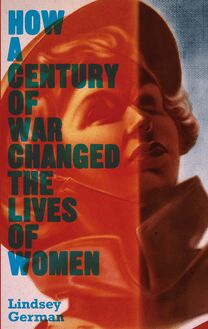The Second World War , livre ebook
213
pages
English
Ebooks
2014
Vous pourrez modifier la taille du texte de cet ouvrage
Obtenez un accès à la bibliothèque pour le consulter en ligne En savoir plus
Découvre YouScribe en t'inscrivant gratuitement
Découvre YouScribe en t'inscrivant gratuitement
213
pages
English
Ebooks
2014
Vous pourrez modifier la taille du texte de cet ouvrage
Obtenez un accès à la bibliothèque pour le consulter en ligne En savoir plus
Publié par
Date de parution
08 mai 2014
Nombre de lectures
1
EAN13
9781849649230
Langue
English
In The Second World War Chris Bambery tests this position in a thorough account of the war and demonstrates why it continues to dominate TV history channels and school history books.
Arguing that the conflict was as much about a division of the world between the great powers as it was as a rising of ordinary people against fascism, he offers a nuanced and radical analysis that sets the book apart from conventional histories of the war.
Acknowledgements
Introduction
1. Competing Empires at a Time of Economic Crisis
2. The Allied Powers
3. The Axis Powers
4. The Countdown to War
5. The Early War
6. Russia: The Crucible of Victory
7. The End of the Third Reich
8. Resistance in Europe
9. Asia and the Pacific
10. The East is Red
11. The Post-War World
Conclusion
Timeline
Notes
Index
Publié par
Date de parution
08 mai 2014
Nombre de lectures
1
EAN13
9781849649230
Langue
English
The Second World War
Counterfire
Series Editor: Neil Faulkner
Counterfire is a socialist organisation which campaigns against capitalism, war, and injustice. It organises nationally, locally, and through its website and print publications, operating as part of broader mass movements, for a society based on democracy, equality, and human need.
Counterfire stands in the revolutionary Marxist tradition, believing that radical change can come only through the mass action of ordinary people. To find out more, visit www.counterfire.org
This series aims to present radical perspectives on history, society, and current affairs to a general audience of trade unionists, students, and other activists. The best measure of its success will be the degree to which it inspires readers to be active in the struggle to change the world.
Also available:
A Marxist History of the World: From Neanderthals to Neoliberals Neil Faulkner
How a Century of War Changed the Lives of Women Lindsey German
Stitched Up: The Anti-Capitalist Book of Fashion Tansy E. Hoskins
The Second World War
A Marxist History
Chris Bambery
First published 2014 by Pluto Press 345 Archway Road, London N6 5AA
www.plutobooks.com
Distributed in the United States of America exclusively by Palgrave Macmillan, a division of St. Martin’s Press LLC, 175 Fifth Avenue, New York, NY 10010
Copyright © Chris Bambery 2014
The right of Chris Bambery to be identified as the author of this work has been asserted by him in accordance with the Copyright, Designs and Patents Act 1988.
British Library Cataloguing in Publication Data A catalogue record for this book is available from the British Library
ISBN 978 0 7453 3302 1 Hardback ISBN 978 0 7453 3301 4 Paperback ISBN 978 1 8496 4921 6 PDF eBook ISBN 978 1 8496 4922 3 Kindle eBook ISBN 978 1 8496 4923 0 EPUB eBook
Library of Congress Cataloging in Publication Data applied for
This book is printed on paper suitable for recycling and made from fully managed and sustained forest sources. Logging, pulping and manufacturing processes are expected to conform to the environmental standards of the country of origin.
10 9 8 7 6 5 4 3 2 1
Typeset from disk by Stanford DTP Services, Northampton, England Text design by Melanie Patrick Simultaneously printed digitally by CPI Antony Rowe, Chippenham, UK and Edwards Bros in the United States of America
To Sheila Atkinson, Auxiliary Territorial Service, and Charles Bambery, Royal Navy: They fought a war in which their enemy was fascism .
Contents
Acknowledgements
Introduction
1
Competing Empires at a Time of Economic Crisis
2
The Allied Powers
3
The Axis Powers
4
The Countdown to War
5
The Early War
6
Russia: The Crucible of Victory
7
The End of the Third Reich
8
Resistance in Europe
9
Asia and the Pacific
10
The East is Red
11
The Post-War World
Conclusion
Timeline
Notes
Index
Acknowledgements
I would like to thank the following people for their help in the writing and editing of this book: Alex Anievas for his comments and corrections, the late and much missed Tom Behan, Ian Birchall for his comments, Sebastian Budgen for first suggesting I write it, Neil Faulkner for editing an earlier draft, Lindsey German for her encouragement, and Barbara Rampoli for her support. My comrades of the International Socialist Group (Scotland) deserve thanks for their support and vitality. Thanks to David Castle, my excellent editor, and everyone at Pluto Press.
Apologies to Carmela Ozzi and Malcolm and Leonardo Ozzi Bambery who have had to put up with me writing in the kitchen, listening to opera and preventing them playing games on the computer.
Whenever I have done meetings and lectures on the Second World War I have always recommended my three favourite books on the subject, so here goes. To understand what the British ruling class was fighting for and to grasp their ineffectiveness at waging war, read Evelyn Waugh’s Sword of Honour trilogy. For the reality of Russia’s war and of Stalingrad, Vasily Grossman’s Life and Fate . And for the sheer scale of the Yugoslav partisan war, Milovan Djilas’s memoir, Wartime .
Chris Bambery November 2013
Introduction
The Second World War casts a long shadow. It dominates the various history channels on offer, along with the rise of the Nazis which preceded it. Popular films about the war still command vast audiences and are repeated endlessly on the small screen. Its ghost has also been present in the wars which have scarred our planet in recent years. The ‘war against terror’ following the attacks of 11 September 2001 was cast as a continuance of democracy’s struggle against a new totalitarian threat which echoed that of the Nazis, while opponents of the wars in Iraq and Afghanistan were regularly portrayed as ‘appeasers’. As the US radio talk-show host and Fox News Channel political analyst, Tammy Bruce, argued in September 2002:
Now, in 2002, it is our responsibility to stop Saddam Hussein and yet the whining grandchildren of Chamberlain, now strewn throughout Europe and the world, have felt compelled to demand we not attack Iraq … no one, especially in Europe, has the moral standing to tell us what to do when faced with war and evil. They lost that right when they accepted hundreds of thousands of American deaths to save their soil from the monsters they refused to stop early on. 1
Iraq in 2003 stood mid-table in the league of global power, with an economy wrecked by a decade of international sanctions. In comparison, when the Second World War began, Germany was the primary military power in the world. Its economy was the second biggest. Attempts to compare Saddam Hussein with Hitler simply demean the latter’s crimes, above all the Holocaust. Saddam was a brutal mass murderer but his crimes do not stand comparison with Hitler’s. 2
At the time of the first Gulf War in 1990–91 we were already being told that Saddam Hussein was another Hitler, and that anything short of military force, for example economic sanctions, would be ‘giving way’ to dictators. The Sun pilloried ‘spineless appeasers’ who believe ‘a combination of sanctions and sweet reason will be enough’, while the Daily Express ridiculed ‘the appeasers and the give-sanctions-a-chance-brigade’ (both from 16 January 1991). The same arguments were deployed again in the build up to the attacks by NATO on Serbia in 1995 and 1999. 3
This attempt to paint critics of the US’s and UK’s wars as spiritual heirs of the British prime minister, Neville Chamberlain, who so desperately tried to buy off Hitler in order to avert war, dates back at least to 1982 when Britain went to war with Argentina over the Falkland Islands, or Malvinas. When the House of Commons debated the decision to go to war the leader of the opposition Labour Party was Michael Foot. Four decades earlier Foot had railed against appeasement and contributed to The Guilty Men , a bestselling pamphlet which appeared in the summer of 1940, blaming Chamberlain and his supporters for the expected German invasion. Describing himself as an ‘inveterate peacemaker’ Foot urged the government ‘to prove by deeds’ that the Falklands had not been betrayed. After he sat down the Tory MP Edward du Cann responded, ‘The leader of the opposition spoke for us all. He did the nation a service.’ 4
Du Cann was consciously echoing the cry of Leo Amery in September 1939. As Chamberlain prevaricated over declaring war on Hitler, despite Germany’s invasion of Poland, the acting Labour leader, Arthur Greenwood, rose to reply. Greenwood began by saying he would speak for the Labour Party; Amery, a right-wing Tory and champion of imperialism, shouted out ‘Speak for England!’ This is held up as one of those great Westminster moments. 5
When US and British political leaders allege today that anti-war leftists and liberals are the heirs to those who curried favour with Hitler, they ignore the simple fact that the appeasers of the 1930s were largely on the right and included virtually the entire British Conservative Party, senior members of the royal family, and the pro-Tory press. These were not rogue elements in British ruling circles. They represented majority opinion. The near revolutionary events which engulfed France in 1934–36, and the full-scale revolution at the commencement of the Spanish Civil War, had reinforced their view that Communism was the main enemy. In London, Berlin, Paris, Moscow, Washington and Tokyo there were real fears before and during the war that social conflict could break through to challenge the ruling order.
In his history of the twentieth century, Eric Hobsbawm argues that the Second World War in the west can be best understood,
not through the contest of states, but as an international ideological civil war … And, as it turned out, the crucial lines in this civil war were not drawn between capitalism and communist social revolution, but between ideological families … between what the 19th century would have called ‘progress’ and ‘reaction’ – only that these terms were no longer quite apposite. 6
From the start it was clear to millions of people that this was not simply a war against Nazism but a war in which their own ruling classes were divided. Nowhere was this truer than in France. The election in May 1936 of a Popular Front government under the Socialist Léon Blum, with communist support, and the subsequent strike wave with its factory occupations, terrified the French ruling class. The fall of France in May and June 1940 can only be understood against this background.
Hobsbawm is half right. There was a huge popular struggle against fascism which developed across much of Europe in the final three years of the war, and because the ruling classes in the occupied countries in large part collaborated with the Nazis this took on aspects of a civil war. But his argument overlooks the fact that the Second World War was


